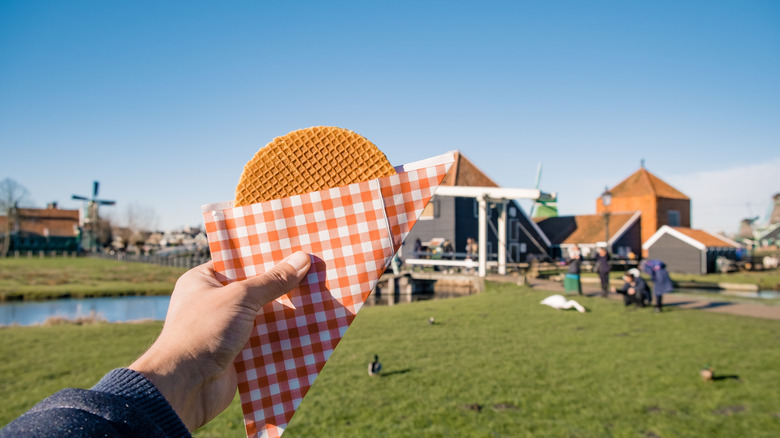The History Of The Cookie Traces Back To The 7th Century
If it seems like cookies have always been there for you in good times and bad, you're not imagining it. A reward for a job well done, tasteful gifts for the holidays, or just popping up next to a cup of afternoon tea, cookies are a quick bite or two of something sweet that can brighten up any moment. They can be as informal as a classic chocolate chip or as fancy as rolled tuiles dipped in chocolate — there's arguably a cookie for every occasion.
So, when exactly did the handheld confections come into existence? Cookies have a long history that's intertwined with the origins of sugar. Without a little sugar, after all, a batch of cookies is really just crackers — you gotta have that sweetness. Sugar has been around for much longer than cookies (per the 2012 book "Genomics of the Saccharinae"). But The Vintage Times reports that it was ancient Persians who started making little cakes from stiff, sweetened dough when they first started figuring out how to cultivate and refine sugar in the 7th century (601 C.E. to 700 C.E.).
Those ancient confections probably didn't have a lot in common with the treats we enjoy today, however. In the thousands of years since the first batch came out of the oven, several different cultures have developed the many styles and flavors of cookies we make and enjoy today.
Cookies through the ages
Cookie baking eventually made its way from Persia (the part of western Asia now known as Iran) to Europe when Muslims conquered Hispania (now Spain) around 718 C.E., during The Crusades, and of course during the spice trade (per What's Cooking America), when sugar was a highly-coveted and expensive ingredient.
By the 14th century, what we would now recognize as cookies were common in European cities, notes The Vintage News. The eminently portable snacks were also stowing away on ships that were circumnavigating the globe, as they could last without spoiling for long periods of time, unlike regular bread, explains Culinary Lore. And they eventually made their way into the ovens of the American colonies. One of the most popular cookies in England appeared in Thomas Dawson's 1596 cookbook "Goode Huswife's Jewel" (via What's Cooking America). The square, short cookie, made with egg yolks and spices, is likely the descendent of the beloved British "biscuit" (per Food Timeline Library). Gingerbread men were also a staple of Queen Elizabeth I's elaborate royal feasts, according to Time.
By the 1700s, cookies were a staple of American cookery, often simply called "tea cakes," which resembled Scottish shortbread, per What's Cooking America. Thanks to the Industrial Revolution, bakers later gained access to new ingredients such as coconuts and oranges, adds Dodo Cookie Dough. And in the early 1900s, when electric refrigeration was invented, many of the cookie recipes (or at least their origins) we use today were created.
How cookies became cookies
How did cookies get their name? Despite their Persian beginnings, the word "cookie" is a decidedly new-world word that has Dutch origins. According to Culinary Lore, the name can be traced back to settlers who brought their recipes to colonies in North America in the early 1600s, most notably New Amsterdam. The Dutch called their handheld confections "koekjes," which is derived from the word for cake: "koek." By the 1700s, when New Amsterdam became New York, the word became Anglicized the word into "cookie" or "cookey."
While people in the United States say "cookie," British people, on the other hand, prefer either the term "biscuit" or use the name of a specific variety when referring to a cookie (ie: macarons). The word "biscuit" comes from the old French word "bescuit," which means "twice-cooked." Not only did the word basically skip right over England, it's entirely possible that the word "biscuit" didn't catch on because Early Americans were averse to "all things British," per FoodTimeline.org.
Whether you call them cookies or biscuits, there's no denying the enduring legacy of the humble cookie, dreamed up centuries ago in ancient Iran.


